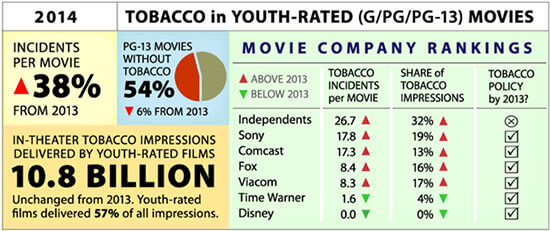If you are a smoker, if you are a parent or even if you are just interested in public health, you may find this report on smoking in movies interesting.
Most smokers start young – the CDC says that 9 out of 10 smokers start by the time they are 19. But with all the knowledge about the health risks, why do kids start? The Addiction Blog lists several reasons, among them: family attitudes, peer pressure and copycatting what is cool in popular culture. Plus, there’s the age-old flirtation with risk and rebellion that marks teenage years for so many.
First, in terms of family attitudes, studies show that children of smokers are more likely to be smokers themselves – a good reason for parents, grandparents, aunties and uncles to quit, if they haven’t already.
But even if parents don’t smoke, kids are influenced by smoking in popular culture and advertising. The CDC reports that in 2012, cigarette and smokeless tobacco companies spent more than $9.6 billion on advertising and promotional expenses in the U.S. alone. In 1998, as part of the Master Settlement Agreement, the tobacco industry agreed to stop targeting youth. But make no mistake – youth are still being targeted in more subtle ways. One way is instances of smoking in the movies.
Hear what Dr. Robert Schwartz, a research scientist at the Ontario Tobacco Research Unit (OTRU) has to say about smoking in films.
This CDC report shows that instances of smoking in films rose 38% from 2013 to 2014.

Some people are trying to hold the film industry accountable – see: Hollywood and Tobacco: New Spotlight on Smoking At The Movies
UC San Francisco is launching a revamped Smokefree Movies website that offers the public unusual insight into Hollywood’s role in the global tobacco epidemic, projected to kill one billion people this century.
Updated every week, the site ranks film producers, directors, writers and actors by their on-screen tobacco footprint based on a database of more than 2,000 films released since 2002.
What can you do?
- Model healthy behavior to kids. Quit tobacco, if you haven’t already. If you are a Member of TotalCare Wellness, call your tobacco cessation coach, we can definitely help you. If not, there are several resources at smokefree.gov.
- Be more aware of pop culture influences on kids. Help make your kids become savvy consumers by being more aware of the manipulative influence of advertising.
- Use the UCSF tools to learn more or to take action. Let Hollywood, magazines, online venues and your legislators know what you think about imagery that glamorizes or promotes smoking to youth.

